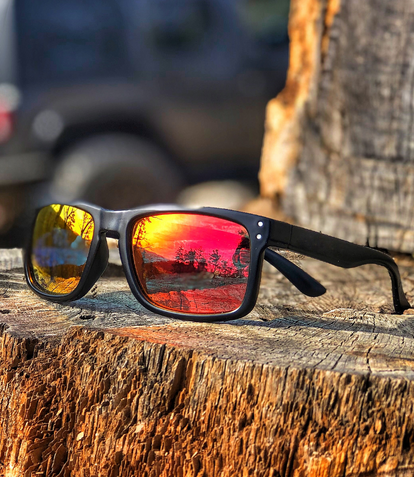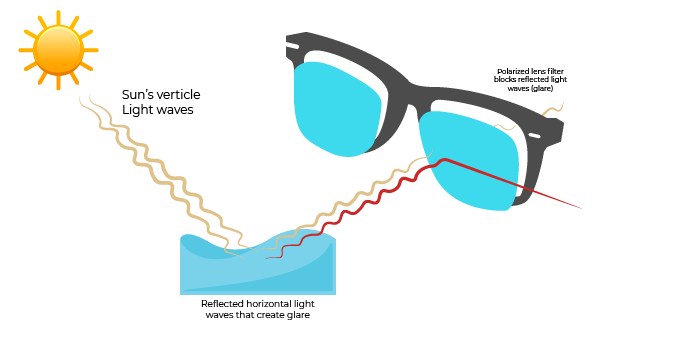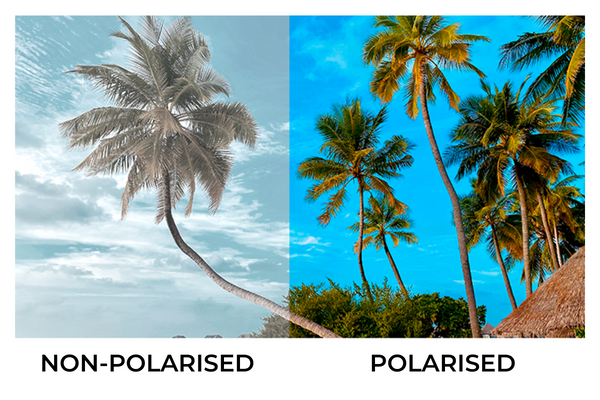

What Are Polarised Sunglasses?
Polarised sunglasses are high-functioning eyewear with many benefits for outdoor enthusiasts. Learn what polarised sunglasses are good for and what the difference is between polarised and non-polarised sunglasses. If you’ve found yourself asking these questions and wondering whether or not polarised sunglasses are good for you, read on to find out more.
What does polarised sunglasses mean?
Polarised sunglasses will block out the horizontal blinding glare that causes you to squint. As the sun hits the surface horizontally, it will bounce off the surface causing the glare. polarised lenses block that glare using an anti-glare filter to create vertical openings for light to pass through. Not only do they make colours more distinguishable, but they also add clarity to your vision by reducing glare from the sun. Glare can be annoying and dangerous as it alters colours and causes visual discomfort, so polarised sunglasses can help you to see more clearly.
How do polarised sunglasses work?
Polarised lenses have opposite layers aligned at the opposite polars. These molecules absorb horizontally polarised light before it reaches your eyes but allow vertically polarised light to pass through. As direct sunlight is unpolarised, the polarisation filter doesn’t completely block out the light – but don’t worry, polarised sunglasses contain other coatings that protect your eyes from direct sunlight.

On the other hand, the benefits of blocking the horizontally reflected light are what make polarised lenses worth the money. You’ll notice this if you’ve ever looked at the water’s surface on a sunny day before and after putting on polarised lenses.
How to tell if sunglasses are polarised
With the aspects of polarised lenses in mind, you can determine whether your sunglasses are polarised by looking through the lenses towards a reflective surface, such as water or pavement. If you don’t experience blurry vision, you are probably wearing sunglasses with polarised lenses.
Another way to test your sunglasses is to put them on and look at your phone or tablet when switched on. If your screen is black, that means your sunglasses are polarised with a filter that blocks horizontally polarised light. All you have to do to see your screen is rotate your device 90 degrees.
What is the difference between polarised and non-polarised sunglasses?
The anti-glare coating on polarised lenses is the main difference between polarised and non-polarised sunglasses. polarised sunglasses are not necessarily better for eye health, as both polarised and non-polarised sunglasses come with UV protection. Another difference between the two types of lenses is the visual quality that each offers. Since polarised sunglasses are blocking out glare, they can end up seeming like a darker, clearer lens.

So, are polarised anti-glare sunglasses better? While it is a matter of preference, there are some situations where non-polarised sunglasses might be more beneficial than polarised sunglasses. For example, polarised sunglasses are not recommended for use in the aviation environment. polarised lenses can also make it more difficult to see electronic screens, so pilots are advised to wear non-polarised sunglasses while flying.
What are the benefits of polarised sunglasses?
Polarised sunglasses can benefit anyone who participates in activities under direct sunlight or near the water. As polarised lenses also reduce glare, they improve visual clarity and enhance the world around us with vibrant colours.
Polarised lenses can also enhance the colour contrast we see when exposed to the sun. This attribute benefits athletes, fishing enthusiasts, and outdoorsmen who want greater depth perception to enhance their performance.
Polarised sunglasses are perfect for time spent by the water, as they help eliminate the light that reflects from the surface. Similarly, polarised lenses are commonly found in ski goggles to improve performance and block the glare reflected off the snow.
Other benefits include:
– Many polarised sunglasses can offer 100% UV protection, but always check the product description to ensure this.
– You can add your prescription to polarised sunglasses so that you can see clearly and protect your eyes simultaneously.
Should you get polarised sunglasses?
Regardless of whether you spend time on the water or near the snow, polarised sunglasses offer many practical applications for everyday life. Having a pair of go-to polarised sunglasses is a no-brainer if you are serious about protecting your eyes from UV light. However, if you need to view strictly digital screens for your job, such as if you are a pilot, you should not wear polarised sunglasses. Contact our opticians for advice if you are unsure whether polarised sunglasses are right for your lifestyle.
If your lifestyle involves spending a lot of time in the sun, you may be exposed to many objects where light is reflected horizontally, such as roads, puddles, cars, and buildings. There’s a high risk of experiencing sudden blinding moments as a result of the glare, which is very dangerous for driving. polarised sunglasses are also a good match if you’re an avid golfer, skier, or fisherman.
The technology of polarised lenses reduces the light that affects your eyesight on a sunny day. Whether you enjoy a day on the lake or skiing down slopes, there are a variety of sunglasses with polarised lenses that will be perfect for you.
If you’re interested in learning about other lenses, read about reflective lenses, Transitions® lenses, and much more. Once you decide which lenses are the best fit for you, have a look at the variety of sunglasses and prescription styles available at SmartBuyGlasses.
What Are Polarised Sunglasses?
Polarised sunglasses are high-functioning eyewear with many benefits for outdoor enthusiasts. Learn what polarised sunglasses are good for and what the difference is between polarised and non-polarised sunglasses. If you’ve found yourself asking these questions and wondering whether or not polarised sunglasses are good for you, read on to find out more.
What does polarised sunglasses mean?
Polarised sunglasses will block out the horizontal blinding glare that causes you to squint. As the sun hits the surface horizontally, it will bounce off the surface causing the glare. polarised lenses block that glare using an anti-glare filter to create vertical openings for light to pass through. Not only do they make colours more distinguishable, but they also add clarity to your vision by reducing glare from the sun. Glare can be annoying and dangerous as it alters colours and causes visual discomfort, so polarised sunglasses can help you to see more clearly.
How do polarised sunglasses work?
Polarised lenses have opposite layers aligned at the opposite polars. These molecules absorb horizontally polarised light before it reaches your eyes but allow vertically polarised light to pass through. As direct sunlight is unpolarised, the polarisation filter doesn’t completely block out the light – but don’t worry, polarised sunglasses contain other coatings that protect your eyes from direct sunlight.

On the other hand, the benefits of blocking the horizontally reflected light are what make polarised lenses worth the money. You’ll notice this if you’ve ever looked at the water’s surface on a sunny day before and after putting on polarised lenses.
How to tell if sunglasses are polarised
With the aspects of polarised lenses in mind, you can determine whether your sunglasses are polarised by looking through the lenses towards a reflective surface, such as water or pavement. If you don’t experience blurry vision, you are probably wearing sunglasses with polarised lenses.
Another way to test your sunglasses is to put them on and look at your phone or tablet when switched on. If your screen is black, that means your sunglasses are polarised with a filter that blocks horizontally polarised light. All you have to do to see your screen is rotate your device 90 degrees.
What is the difference between polarised and non-polarised sunglasses?
The anti-glare coating on polarised lenses is the main difference between polarised and non-polarised sunglasses. polarised sunglasses are not necessarily better for eye health, as both polarised and non-polarised sunglasses come with UV protection. Another difference between the two types of lenses is the visual quality that each offers. Since polarised sunglasses are blocking out glare, they can end up seeming like a darker, clearer lens.

So, are polarised anti-glare sunglasses better? While it is a matter of preference, there are some situations where non-polarised sunglasses might be more beneficial than polarised sunglasses. For example, polarised sunglasses are not recommended for use in the aviation environment. polarised lenses can also make it more difficult to see electronic screens, so pilots are advised to wear non-polarised sunglasses while flying.
What are the benefits of polarised sunglasses?
Polarised sunglasses can benefit anyone who participates in activities under direct sunlight or near the water. As polarised lenses also reduce glare, they improve visual clarity and enhance the world around us with vibrant colours.
Polarised lenses can also enhance the colour contrast we see when exposed to the sun. This attribute benefits athletes, fishing enthusiasts, and outdoorsmen who want greater depth perception to enhance their performance.
Polarised sunglasses are perfect for time spent by the water, as they help eliminate the light that reflects from the surface. Similarly, polarised lenses are commonly found in ski goggles to improve performance and block the glare reflected off the snow.
Other benefits include:
– Many polarised sunglasses can offer 100% UV protection, but always check the product description to ensure this.
– You can add your prescription to polarised sunglasses so that you can see clearly and protect your eyes simultaneously.
Should you get polarised sunglasses?
Regardless of whether you spend time on the water or near the snow, polarised sunglasses offer many practical applications for everyday life. Having a pair of go-to polarised sunglasses is a no-brainer if you are serious about protecting your eyes from UV light. However, if you need to view strictly digital screens for your job, such as if you are a pilot, you should not wear polarised sunglasses. Contact our opticians for advice if you are unsure whether polarised sunglasses are right for your lifestyle.
If your lifestyle involves spending a lot of time in the sun, you may be exposed to many objects where light is reflected horizontally, such as roads, puddles, cars, and buildings. There’s a high risk of experiencing sudden blinding moments as a result of the glare, which is very dangerous for driving. polarised sunglasses are also a good match if you’re an avid golfer, skier, or fisherman.
The technology of polarised lenses reduces the light that affects your eyesight on a sunny day. Whether you enjoy a day on the lake or skiing down slopes, there are a variety of sunglasses with polarised lenses that will be perfect for you.
If you’re interested in learning about other lenses, read about reflective lenses, Transitions® lenses, and much more. Once you decide which lenses are the best fit for you, have a look at the variety of sunglasses and prescription styles available at SmartBuyGlasses.












































